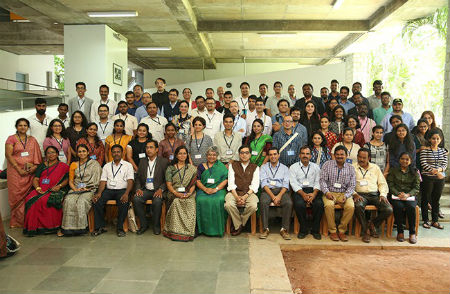IIM Bangalore’s Centre for Public Policy hosts XII International Conference on Public Policy & Management
Bengaluru: The Centre for Public Policy (CPP) at IIM Bangalore welcomed academicians, public policy makers and people from voluntary organizations to the XII International Conference on Public Policy & Management that was inaugurated today.
The theme of this year’s conference is ‘Inclusion and Exclusion: Policy and Practice’. The three-day annual international event brings together scholars, practitioners, experts, researchers and policy makers of different disciplines to discuss diverse policy-related issues.
The conference, now in its 12th year, provides an avenue for disseminating contemporary public policy research and emerging practices across a wide set of domains.
This year saw 200 paper submissions, which explored different ways by which policy processes impact social outcomes using both theoretical and empirical lenses spanning research and practitioner pieces that cover academia, industry, and the government. These were actively peer-reviewed by faculty from the Centre for Public Policy (CPP), IIM Bangalore, to select the final set of papers.
This year’s conference has a broad mix of academic sessions, topical policy debates, workshops, panel discussions and practitioner-oriented discussions around key topics in public policy and management and ongoing contemporary policy research in India. These include tracks on Political Economy, Right to Education, Health, and specially organized sessions around Argumentative Policy Analysis, Conflict, Security and Policy, Role of Agricultural Information Delivery in Sustainably Increasing Farm Incomes in India, Role of Technology in Enabling Educational Inclusion, Peri-urban Areas: Dynamics of Change, Ecosystems and Governance, and more.
The conference began on August 5 with a Public Policy Hackathon, which revolved around ways to develop apps focussed on exploiting fragmented data repositories to create a policy tool that can help improve program and policy outreach, enrolment and outcomes. This is in partnership with a non-profit that was incubated at the entrepreneurship and innovation hub of IIM Bangalore N. S. Raghavan Centre for Entrepreneurial Learning (NSRCEL) – MapUnity. This was followed by presentations of short-listed submissions from the Policy Hackathon where policy makers participated in identifying the final winners of the Hackathon.
On August 07 (Monday), Prof. Anjan Mukherji, Professor Emeritus, Centre for Economic Studies and Planning, School of Social Sciences, Jawaharlal Nehru University, delivered the keynote address on ‘The Role of Government or the Size of Government?’
Talking about the size of governments, of which size of government spending and bureaucratic structure are indicators, he pointed out that more than desirable size of governments, what governments should do is the more important question. “Governments could be large or small but they should work for the wellbeing and prosperity of the citizens,” he added.
Quoting eminent economists, social scientists and thinkers down the ages like Buchanan, Musgrave, Chanakya, Adam Smith, Milton Friedman and Mancur Olson, he said from ‘Arthashastra’ down to modern times, there was no difference of opinion about the government’s role which is to ensure best possible governance, by removing obstructions to economic activity, enforcing private contracts to foster competitive markets, maintaining peace and tranquillity, maintaining law and order, providing public goods of high quality, raising adequate taxes, maintaining a court system and ensuring administration of (prompt) justice, and upholding democracy.
About the way forward, he said that governments need to engage with a set of functions based on the current economic paradigm. “There should be an SLP (Stabilize, Liberalize and Privatize) regime, and the size of government activities should shrink. However, in ensuring these, certain things can go wrong – such as asymmetric information, externalities market failure, and contractual obligation. If free trade is better than no trade, you need courts and other corrective steps to back you up. Hence, the recommended solutions are implementing taxes, assigning property rights, certifying quality. Moreover, contractual agreements should be protected by courts of law. The government has to ensure all this. Incentives of government officials to carry these out may be minimal, so scams and frauds occur. That is why people say governments should be kept small.”
Earlier in the day, Dr. Arnab Mukherji, Chairperson, Centre for Public Policy, introduced the theme of the conference and hoped it would provide a platform for useful conversations between academicians, public policy makers and NGOs.
A panel led by Dr. Ashutosh Varshney, from Brown University, on ‘Electoral Practices in India’, featured policy makers, politicians and academics, including Prof. Rajeev Gowda, MP, Rajya Sabha.
The plenary on August 8 will seek to explore the status and current practice of Decentralization of Public Policy in India after the 73rd and 74th Amendments to the Constitution in the early 1990s.
Dr. M. Govinda Rao, Emeritus Professor, National Institute of Public Finance and Policy (NIPFP), will lead the panel discussion with insights from T. Raghunandan, former secretary, Ministry of Rural Development and Panchayati Raj, Prof. Sandeep Shastri, Pro-Vice Chancellor, Jain University, and V. M. Ghordpade, Vice President, Karnataka Pradesh Congress Committee.
The sessions on August 9 will include a plenary that seeks to push the discourse on how the fragmented healthcare system can be brought within a common framework to achieve integrated pathways for care at multiple levels and at multiple geographies in a country like India where informality drives the economy. The participants will include B. S. Ajaikumar, CEO and Chairman, HCG Hospitals, Shalini Rajneesh, Principal Secretary, Ministry of Health, GoK, Srinivas Prasad, CEO, Philips Innovation Center and K. Sujatha Rao, Former Secretary for Health and Family Welfare, GoI and author of ‘Do We Care?’ Dr. Arnab Mukherji, Chairperson, Centre for Public Policy, IIM Bangalore and Prof. Chirantan Chatterjee from ISB will anchor this track in an effort to drive forward policy conversations in the health sector.
The closing address for the conference will be delivered by Professor G. Raghuram, Director, IIM Bangalore, on ways forward in engaging with policy research, curating public policy debates and influencing public policy.

